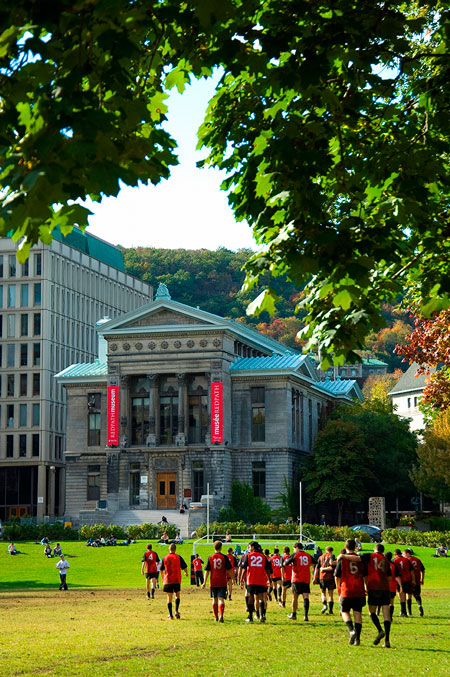Legislation
 Although no specific piece of legislation defines the university system, each university was created by royal charter or by special act.
Although no specific piece of legislation defines the university system, each university was created by royal charter or by special act.
For example, the Université du Québec, founded in 1968, was created under Act respecting the Université du Québec that provides for the issuance of letters patent by the government. The Act respecting educational institutions at the university level, in which Quebec's university institutions are listed, provides that the term "university" is reserved for the ends set out in the act.
Program quality control is performed via the Bureau de Coopération Interuniversitaire (BCI), a voluntary university coordinating body. Each university has created an assessment policy for existing programs. Assessment practices are reviewed by BCI's Program Evaluation Review Commission (Commission de la vérification de l'évaluation des programmes - CVEP). New programs leading to a university degree (bachelor's, master's, or doctoral) are submitted to BCI's New Program Evaluation Commission (Commission de l'évaluation des projets de programmes - CEP), which renders an opinion as to academic quality.
The Ministère de l'Enseignement supérieur du Québec reviews the opinion. Decisions on funding enrolment in new programs are taken based on the provisions in the document entitled Procédure liée à l'examen d'opportunité des projets de programmes conduisant à un grade présentés au ministre de l'Éducation, du Loisir et du Sport aux fins de financement et Critères d'opportunité utilisés par le Comité des programmes universitaires.
These complementary mechanisms are designed to assess each institution's proposed programs and to ensure the relevance of university program offerings.
University financing is largely provided by the Quebec government. In return, the government expects that institutions will use these funds efficiently and account for their management. The Politique québécoise de financement des universités (Quebec university funding policy) is designed on the one hand to guarantee the quality of training and research, taking into account the specific situation of each institution, and on the other hand to support the goals set out in the policy. This policy is reflected in budget rules set each year by the Ministère de l'Enseignement supérieur du Québec.
Affiliation
The École Polytechnique (created in 1873) and the École des Hautes Études Commerciales de Montréal (created in 1907) are degree-granting institutions that were created by special acts prior to the creation of the Université de Montréal and that decided in 1920 to conclude an affiliation agreement with the latter institution. This affiliation agreement governs and affirms the status of degrees granted by these institutions as being also degrees granted by the Université de Montréal. The three institutions have separate boards of governors. However, some institutions (either in the same sector or in different sectors) have entered into agreements covering specific programs. Such agreements are governed by protocols that the institutions concerned are responsible for applying. Thus quality control measures are the same as for new programs. Students in those programs have library privileges in all institutions involved, under a BIC-governed agreement.
Such programs exist at all levels and include the following models:
- joint programs (involving resources from several institutions)
- extension programs (under the responsibility of the originating institution)
- network or associated programs (involving two faculties within an institution, or several different institutions)
External and Internal Review
 Each institution is required to set a periodic program assessment policy, using its own professors and lecturers as well as students and graduates, employers if appropriate, and external specialists and international experts. These periodic assessment processes are reviewed by BIC's Program Evaluation Review Commission (Commission de vérification de l'évaluation des programmes - CVEP).
Each institution is required to set a periodic program assessment policy, using its own professors and lecturers as well as students and graduates, employers if appropriate, and external specialists and international experts. These periodic assessment processes are reviewed by BIC's Program Evaluation Review Commission (Commission de vérification de l'évaluation des programmes - CVEP).
Teacher training programs must be approved by the Comité d’agrément des programmes de formation à l’enseignement (CAPFE) transitoire.
Professional Accreditation
The Regulation respecting the diplomas issued by designated educational institutions which give access to permits or specialist’s certificates of professional orders was adopted under the Professional Code. Professional governing bodies ensure that training is adequate to acquire the professional skills required for the practice of a profession. Professional governing bodies generally create an advisory committee on training to review the quality of training in respect of (a) the objectives of training programs leading to a diploma entitling the holder to a licence or specialist certificate; (b) the aims of other conditions for the issuance of a licence or specialist certificate; and (c) diploma or training equivalency standards set out by regulation by the executive committee of the professional governing body and entitling the applicant to a licence or specialist certificate.
The Professional Code provides an overview of Quebec professions and each governing body's procedures. The Office des professions du Québec is responsible for implementing the Code des professions.
Some professional governing bodies (such as the Ordre des ingénieurs du Québec) may be members of an association that includes several governing bodies (such as the Canadian Council of Professional Engineers). Such associations may exercise accreditation functions in respect of university training programs, based on Canadian or international standards. However, such certification practices are distinct from the quality assurance mechanisms described above.
Other Mechanisms
In addition to BIC's membership, Quebec universities are also members of the Universities Canada. Universities Canada has adopted quality assurance principles to which leaders of university institutions subscribe. Universities Canada imposes membership criteria that address the primary mission of institutions, the range of program offerings, the breadth and depth of programs, the nature of their relationship with parent institutions, the size of enrolment, institutional focus on scholarship, academic inquiry and research, and compliance with the principles of academic freedom and responsibility. Institutions applying for membership must host an Universities Canada visiting committee that reports to the Universities Canada Board of Directors on a variety of items and recommends a decision on whether the applying institution is providing education of university standard.
Many provincial and pan-Canadian professional associations of administrators and universities are also concerned with promoting quality. Student associations are active as well in ensuring that both programs and conditions of learning are at the highest possible level.
In addition to the l'Office des professions du Québec, the Association of Accrediting Agencies of Canada (AAAC) is a national organization composed of professional associations involved in promoting good practices by its members in accreditation of educational programs.